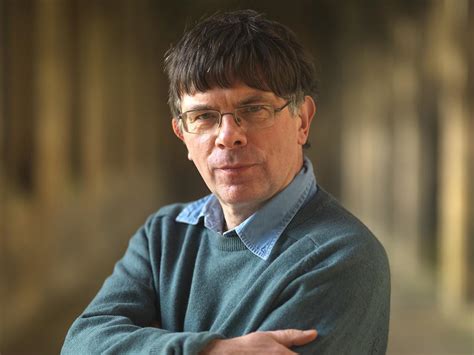A Quote by Marcel Proust
But to ask pity of our body is like discoursing in front of an octopus, for which our words can have no more meaning than the sound of the tides, and with which we should be appalled to find ourselves condemned to live.
Related Quotes
The moment we shake our addiction to narrative and give up our strong-headed intent that language must say something "meaningful," we open ourselves up to different types of linguistic experience, which could include sorting and structuring words in unconventional ways: by constraint, by sound, by the way words look, and so forth, rather than always feeling the need to coerce them toward meaning.
If you go to the octopus, and if you're not too squeamish, dissect it. You'll find that it has a camera eye which is remarkable similar to our own. And yet we know that the octopus belongs to an invertebrate group called cephalopod mulluses, evolutionarily very distant indeed from the chordates to which we belong.
In a world in which we are exposed to more information, more options, more philosophies, more perspectives than ever before, in which we must choose the values by which we will live (rather than unquestioningly follow some tradition for no better reason than that our own parents did), we need to be willing to stand on our own judgment and trust our own intelligence-to look at the world through our own eyes-to chart our course and think through how to achieve the future we want, to commit ourselves to continuous questioning and learning-to be, in a word, self-responsible.
Among the older records, we find chapter after chapter of which we can read the characters, and make out their meaning: and as we approach the period of man's creation, our book becomes more clear, and nature seems to speak to us in language so like our own, that we easily comprehend it. But just as we begin to enter on the history of physical changes going on before our eyes, and in which we ourselves bear a part, our chronicle seems to fail us-a leaf has been torn out from nature's record, and the succession of events is almost hidden from our eyes.
In order to find God in ourselves, we must stop looking at ourselves, stop checking and verifying ourselves in the mirror of our own futility, and be content to be in Him and to do whatever He wills, according to our limitations, judging our acts not in the light of our own illusions, but in the light of His reality which is all around us in the things and people we live with.
When we reveal ourselves to our partner and find that this brings healing rather than harm, we make an important discovery - that intimate relationship can provide a sanctuary from the world of facades, a sacred space where we can be ourselves, as we are ...This kind of unmasking - speaking our truth, sharing our inner struggles, and revealing our raw edges - is sacred activity, which allows two souls to meet and touch more deeply.
If we could sufficiently understand the order of the universe, we should find that it exceeds all the desires of the wisest men, and that it is impossible to make it better than it is, not only as a whole and in general but also for ourselves in particular, if we are attached, as we ought to be, to the Author of all, not only as to the architect and efficient cause of our being, but as to our master and to the final cause, which ought to be the whole aim of our will, and which can alone make our happiness.
There is provided an escape from the narrowness and poverty of the individual life, and the possibility of a life which is other and larger than our own, yet which is most truly our own. For, to be ourselves, we must be more than ourselves. What we call love is, in truth . . . the losing of our individual selves to gain a larger self.







































